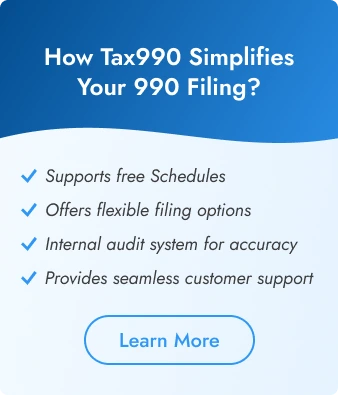What Should Employee Funded Pension Trust Know About Tax Exemption and Form 990 Filing?
- Updated August 14, 2023 - 2.00 PM - Admin, Tax990
Nonprofit organizations are classified under different IRC sections for federal tax exemption purposes based on their type and how they operate.
This article describes Employee Funded Pension Trusts, the IRC section under which they can get classified, how they can obtain tax-exempt status, their 990 filing requirements,
and more.
Table of Contents:
How Does the IRS Define Employee Funded
Pension Trusts?
As per the IRC Section 501(c)(18), Employee Funded Pension Trusts are organizations that were organized before June 25, 1959 and operated for the purposes of paying benefits under the
pension plan.
These trusts are funded only by the contribution of employees who are the plan members and not
by the employers.
Also, these trusts are required to be part of a plan whose eligibility criteria and benefits do not discriminate in a way that favors officers, shareholders, supervisors, or highly compensated employees.
The benefits should be determined only according to the objective standards.
How Can Employee Funded Pension Trusts Apply for
Tax Exemption?
Employee Funded Pension Trusts (organized before June 25, 1959) that are involved in the activities described above can apply for tax-exempt status under IRC section 501(c)(18) by filing Form 1024 - Application for Recognition of Exemption Under Section 501(a) or Section 521 of the IRC.
This form can only be filed electronically. Upon acceptance, the IRS will provide the organizations with a determination letter recognizing them with tax-exempt status.
What are the 990 filing Requirements for Employee Funded Pension Trusts?
The IRS requires the 501(c)(18) Employee Funded Pension Trusts that obtained tax-exempt status to file 990 Series Forms annually. Generally, the information reported by these trusts on their 990 forms is used by the IRS to ensure that the trusts are complying with the guidelines established.
Based on the gross receipts and assets, the Employee Funded Pension Trusts must choose and file the applicable 990 form.
Employee Funded Pension Trusts whose gross receipts of $50,000 or less must file form 990-N.
Employee Funded Pension Trusts whose gross receipts are less than $200,000 and assets less than $500,000 must e-file form 990-EZ.
Employee Funded Pension Trusts whose gross receipts of $200,000 or more (or) assets of $500,000 or more must file their form 990 online.
Additional Filing Requirements
Based on the details they report on their Form 990 or 990-EZ, these trusts may be required to include certain 990 Schedules.
Additionally, pension trusts with an unrelated business income of $1000 or more are required to file Form 990-T electronically.
When is the Form 990 Deadline for Employee Funded
Pension Trusts?
The deadline for filing 990 series is the 15th day of the 5th month following the end of their
accounting period.
For organizations following the calendar tax year, the deadline will be May 15th.
Operating on a Fiscal Tax Year? Find your 990 Deadline using our due date calculator.
If the deadline falls on a Saturday, Sunday, or any federal holiday, the deadline will be pushed to the following business day.
Employee Funded Pension Trusts can Simplify Form 990 Filing with Tax990!
In order to complete and e-file their 990 returns efficiently, Employee Funded Pension Trusts and other tax-exempt organizations need to get started with a reliable e-file provider, and Tax 990 can be a
perfect choice.
Here are some of the exclusive features offered by Tax990,
Free Schedules - Tax990 will include the applicable Schedules at no extra cost.
Bulk Upload - Our Excel templates facilitate the bulk upload of contributions and grants details.
Internal Audit System - The 990 forms are audited for any errors before transmission.
Reviewers and Approvers - The completed returns can be shared with the organization’s board members for review and approval.
Seamless Customer Support - We have a team of experts available via live chat, phone, and email to handle any questions.


